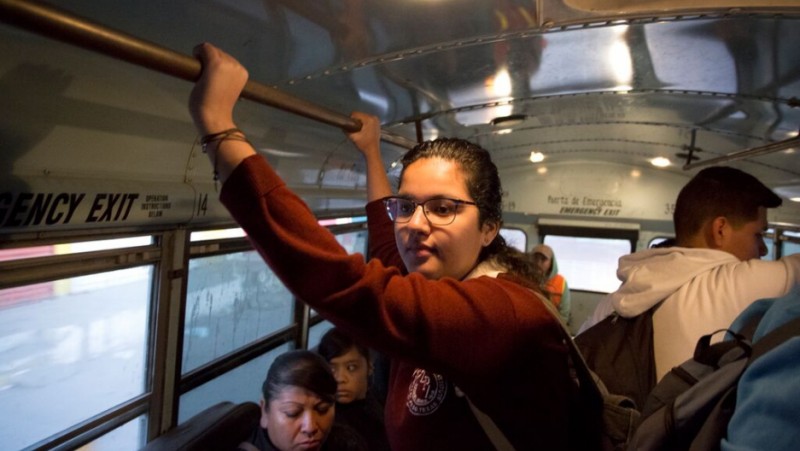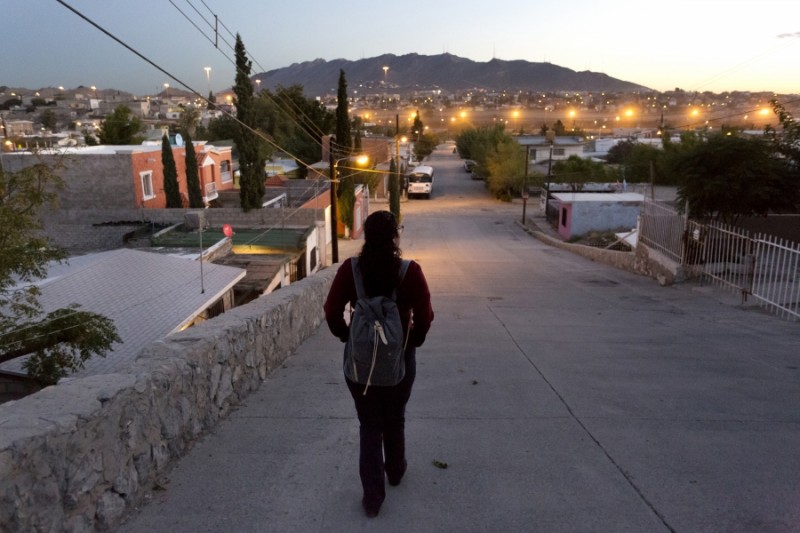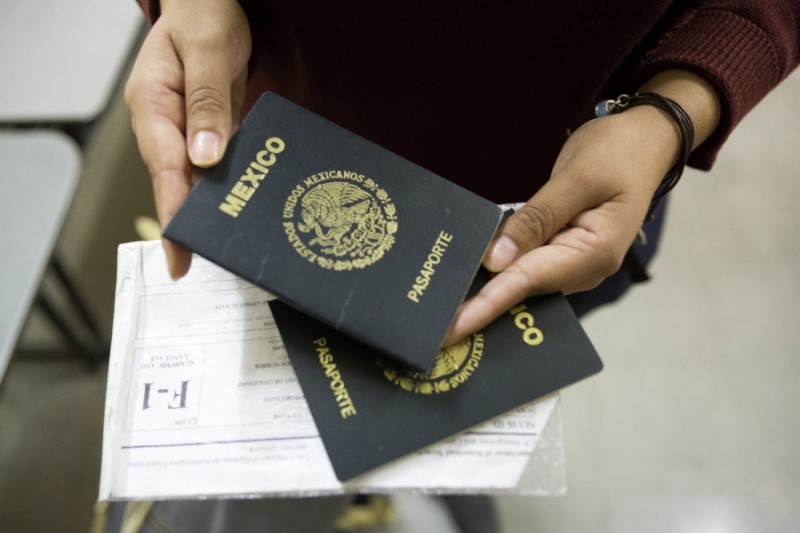
During the school week, Arlet Burciaga rides a bus toward the international bridge in Ciudad Juárez. Credit: Miguel Gutierrez Jr./KUT News. Used with permission.
This article and radio report by Kate McGee and photographer Miguel Gutierrez Jr. for The World originally appeared on PRI.org on November 5, 2015, and is republished here as part of a content-sharing agreement.
Wake up, get dressed, pack your homework, maybe a lunch. That’s the typical morning routine for most students. But some students on the US-Mexico border grab something else on their way out the door — their passports. Nineteen-year-old Arlet Burciaga is one of those students.

A view of the Colonia Alta Vista neighborhood in Ciudad Juarez. Credit: Miguel Gutierrez Jr./KUT News. Used with permission
Arlet has been awake for more than an hour. She stands in her modest kitchen in her home in Ciudad Juárez, Mexico. The walls are mostly bare except for a small sign that reads “Feliz” — Happy. Her mom, Martha Flores Ibarra, counts pesos.

Before she leaves, Arlet's mother, Martha Flores Ibarra, arrives home at 6:30 am after working at one of the transnational maquiladora factories located in Ciudad Juarez. Credit: Miguel Gutierrez Jr./KUT News. Used with permission.
Martha just got home from an overnight shift at a car parts factory where she makes about $45 dollars per week. They live with Arlet's younger sister and older brother, who also works in a factory in Juárez. Martha hands Arlet three pesos for the bus and four for the bridge toll. She gives her a hug and a kiss, and Arlet is on her way.
6:54 a.m.

Arlet's passes through Colonia Alta Vista on her way to El Paso, Texas. Credit: Miguel Gutierrez Jr./KUT News. Used with permission.
Arlet leaves for school.
She lives in Mexico, but her school is in the US — the Lydia Patterson Institute, a private Methodist school in El Paso. Arlet could go to school in Mexico, but when she heard through her church about the US high school, she applied and received a full scholarship. The school also gives her money to cross the border each day — and $20 per month for other expenses.
6:59 a.m.

Arlet boards a bus towards the international bridge in Ciudad Juarez. Credit: Miguel Gutierrez Jr./KUT News. Used with permission.
The bus arrives right as Arlet gets to the bus stop. There are very few people on the streets, but the bus is full of people.
It's a short ride to the bridge and, for Arlet, this daily trip has become the norm, even though she knows it's anything but. “I don't think it's pretty normal,” Arlet says, laughing a bit. “I think it's [a] big deal to cross the bridge every day. It's [a] big experience because every day you never know what is going to happen in the bridge or during the walk to your house.”

A line of cars forms down Calle Juarez in the early morning at the Puente Internacional Paso Del Norte. The cars are waiting to cross the bridge into El Paso, Texas. Credit: Miguel Gutierrez Jr./KUT News. Used with permission.
Once known as “the murder capital of the world,” Juárez is still recovering economically from cartel violence between 2009 and 2012. But now, people on both sides of the border say they feel safe in the city. People who live in El Paso and Juárez say there is a misconception about life at the border. Despite current politics surrounding immigration, people constantly flow back and forth on a daily basis.
Sometimes crossing can be difficult. Security tightens and lines get much longer when things happen, like the September 11 terrorist attacks and the Boston Marathon Bombings. Other times, Arlet cannot get through because, like a normal high schooler, she forgets things, including her passport.
7:05 a.m.

Arlet pays a 4 peso toll in order to exit Mexico and enter the international bridge towards Texas. Credit: Miguel Gutierrez Jr./KUT News. Used with permission.
Arlet arrives at the toll booth. “Today, there is a lot of line,” she says as she walks. “I don't know why, but we need to get in the line.” At the bottom of the bridge, there is a large sign that hangs over the road. “Feliz Viaje,” she says. “Happy trip or something like that.”
A few years ago, Arlet would've had a tough time translating from Spanish to English. Before she attended Lydia Patterson she only spoke Spanish and had never been to the US. “The teachers talked to me and I was like, ‘I don't understand.’ And it was a very hard, hard moment for me.”
7:15 a.m.
Five minutes after she crosses the bridge, Arlet goes through US customs. Seventy percent of the 435 students at her school cross the border daily. Some are US citizens who live in Mexico.
Others, like Arlet, are Mexican. Arlet waits in line with her friend, Vicki. Usually, there is separate a line for students. Today, it's closed.
“It's unfair,” says Vicki. “There aren't many immigrations officials today.”
“Which [line] is moving faster?” Arlet asks. “This one or this one?”
“And they closed the line for students, which is necessary,” Vicki says, ignoring Arlet.

Arlet holds her passport and visa. These documents allow her to cross into the United States and study in El Paso. Credit: Miguel Gutierrez Jr./KUT News. Used with permission.
In front of them, a man is pulled aside. The agent checking his passport takes him into a separate room. “Maybe he doesn't have the required documentation?” Arlet wonders. “He's suspicious, I think.”
Another few minutes pass before another agent signals to them and checks their passports.
“Where you going?” the officer asks.
“Escuela,” Arlet answers.
Related: Global Nation Education
7:45 a.m.

Arlet hands her documents to an immigration officer in El Paso, Texas. This a regular task for Arlet during the school week. Credit: Miguel Gutierrez Jr./KUT News. Used with permission.
Arlet passes customs without incident. Once in El Paso, she is on her own. Her mom doesn’t have a passport and can’t cross the border. If something happens to Arlet on the US side, her mom couldn’t come and help.
7:55 a.m.

Once at school, Arlet helps herself to breakfast at the school cafeteria. Students are provided with a breakfast and lunch. Credit: Miguel Gutierrez Jr./KUT News. Used with permission.
Arlet arrives at school. Once there, she heads to the cafeteria for breakfast. Lydia Patterson serves free breakfast and lunch to all its students.
8:30 a.m.

After breakfast, Arlet sits in her first period class, and looks over class materials. Credit: Miguel Gutierrez Jr./KUT News. Used with permission.
Arlet starts the day in English class. She takes three English courses every day. This week, she has exams in every subject.
Nearly all of the students at the school graduate and go to college. The school has strong connections with Methodist colleges across the US. They help the students navigate the college admissions process and get scholarships. Socorro de Anda, president of Lydia Patterson, says a college degree could change Arlet’s life — and her family's, too. “We've seen many, many families pulled out of poverty because one child has gone through here and has gone through college,” she says.
3:05 p.m.

Arlet wipes a table at the Lydia Patterson Institute. Her work is part of her scholarship. Credit: Miguel Gutierrez Jr./KUT News. Used with permission.
It's the end of the school day, but Arlet's not done yet. Students work after school for their scholarships, helping with custodial or clerical work.
4:21 p.m.

After a day of classes, Arlet and fellow classmates walk towards the Paso Del Norte International Bridge in El Paso. Credit: Miguel Gutierrez Jr./KUT News. Used with permission.
Arlet begins her trip back home. After three years of this daily cross-border commute, Arlet says she is tired, but she knows it is worth it. “I think it is a blessing of God to my life because it gave me an opportunity to learn a new culture, the American culture, to [have] new experiences in my life,” she says.
Now, Arlet is ready for a new journey: off to college. It’s unclear where, yet. She hopes it’s in the US. If so, she can leave her passport at home.
Share your thoughts and ideas on Facebook at our Global Nation Exchange, on Twitter@globalnation, or contact us here.







1 comment